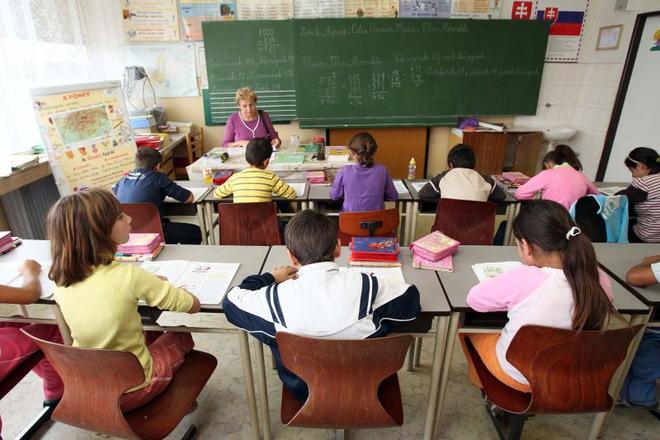THE SIMPLE fact that a Roma pupil does not understand Slovak upon entering primary school can land them in a special school, which then goes on to determine help determine whether they will receive and quality education more generally.
Peter Pollák, the government’s plenipotentiary for Roma communities, says compulsory preschool education for children from age 3 could solve this, as well as other problems of children from excluded communities. He made this proposal in 2013 as part of reforms that his office, a division of the Interior Ministry, announced at the start of his tenure. Little has been implemented thus far.
Pollák again endorsed his idea to make preschool compulsory for Roma children at a conference about the education of Roma children on March 5. He argues that beside the compulsory kindergartens being the best solution for the children, it is also a cheaper option for the state.
“Roma children must enter the education system prepared, so that they do not end up in zero grades or in special primary schools that cost [the state] double the money,” Pollák said in a debate on the public-service Slovak Radio.
A similar proposal was on the table also in June 2013, when MPs of the opposition Freedom and Solidarity (SaS) wanted to introduce compulsory preschool education for Roma children starting at age 4.
At the moment, preschool education is not compulsory in Slovakia, although kindergartens must admit children one year before they begin primary school.
Ministry sees discrimination
It is however not clear whether the ruling Smer party would support Pollák’s initiative and propose the respective law in the parliament, despite the fact that two years ago, when Pollák first presented the idea of compulsory preschool for children from Roma communities, he was fully supported by Interior Minister Robert Kaliňák.
Pollák, who is also an MP for the opposition Ordinary People (OĽaNO) party, plans to propose the compulsory preschool in parliament on his own if he fails to win the support of Smer.
The Education Ministry shows little enthusiasm for making kindergartens compulsory for Roma children. They label it discriminatory. So did the European Commission representatives who stressed that it is not possible to introduce compulsory preschool education on an ethnic basis, the SITA newswire reported.
The Education Ministry currently runs two projects aimed at preschool education: a project that costs €7.3 million overall, which aims to include children from marginalised communities in preschool education, and the TRIMED project which costs €15.7 million overall which finances so-called inclusive teams that prepare children for primary school education, ministry official Martina Slušná told the Slovak Radio.
“We have to focus on inclusive principle and include all children based on the same principle and the same possibilities,” Slušná said.
Prejudice at work
Ombudswoman Jana Dubovcová, who pointed out continued segregation of Roma children in the Slovak education system in her recent annual report, does not believe the compulsory preschool for children from early age could solve their problems at school.
She called for creating such conditions in the preschool education that would motivate Roma parents to send their children to kindergartens. Namely, that the majority would adopt the opinion that “the access of Roma children to good-quality education is really needed and it is for the benefit of the whole society”, the TASR newswire reported.
In reality, the public opinion is burdened by prejudice, for instance the belief that Roma mothers are not willing to put their children to kindergartens, Dubovcová said.
Laco Oravec from the non-governmental Milan Šimečka Foundation also noted that the parents’ willingness to send their children to kindergarten is not the major issue. The problem is that the capacities of the existing preschool facilities are limited, Roma children often don’t get admitted, or it is too far or too expensive for them to travel to the nearest kindergarten.
“We should rather [work on] removing the existing barriers,” Oravec told the Slovak Radio.


 (source: Sme - Tibor Somogyi)
(source: Sme - Tibor Somogyi)